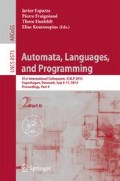Abstract
Cellular automata are discrete dynamical systems and a model of computation. The limit set of a cellular automaton consists of the configurations having an infinite sequence of preimages. It is well known that these always contain a computable point and that any non-trivial property on them is undecidable. We go one step further in this article by giving a full characterization of the sets of Turing degrees of limit sets of cellular automata: they are the same as the sets of Turing degrees of effectively closed sets containing a computable point.
This work was sponsored by grants EQINOCS ANR 11 BS02 004 03 and TARMAC ANR 12 BS02 007 01.
Access this chapter
Tax calculation will be finalised at checkout
Purchases are for personal use only
Preview
Unable to display preview. Download preview PDF.
References
Bennett, C.H.: Logical Reversibility of Computation. IBM J. Res. Dev. 17(6), 525–532 (1973)
Ballier, A., Guillon, P., Kari, J.: Limit Sets of Stable and Unstable Cellular Automata. Fundam. Inform. 110(1-4), 45–57 (2011)
Cenzer, D., Remmel, J.: \(\Pi_1^0\) classes in mathematics. In: Handbook of Recursive Mathematics - Volume 2: Recursive Algebra, Analysis and Combinatorics. Studies in Logic and the Foundations of Mathematics, ch. 13, vol. 139, pp. 623–821 (1998)
Formenti, E., Kůrka, P.: Subshift attractors of cellular automata. Nonlinearity 20, 105–117 (2007)
Hooper, P.K.: The Undecidability of the Turing Machine Immortality Problem. Journal of Symbolic Logic 31(2), 219–234 (1966)
Hurd, L.P.: Formal Language Characterization of Cellular Automaton Limit Sets. Complex Systems 1(1), 69–80 (1987)
Hurd, L.P.: Nonrecursive Cellular Automata Invariant Sets. Complex Systems 4(2), 131–138 (1990)
Hurd, L.P.: Recursive Cellular Automata Invariant Sets. Complex Systems 4(2), 131–138 (1990)
Jockusch, C.G., Soare, R.I.: Degrees of members of classes \(\Pi_1^0\). Pacific J. Math. 40(3), 605–616 (1972)
Jeandel, E., Vanier, P.: Hardness of Conjugacy, Embedding and Factorization of multidimensional Subshifts of Finite Type. In: STACS. LIPIcs, vol. 20, pp. 490–501 (2013)
Jeandel, E., Vanier, P.: Turing degrees of multidimensional SFTs. In: Theoretical Computer Science 505.0. Theory and Applications of Models of Computation, pp. 81–92 (2011)
Kari, J.: Reversibility of 2D cellular automata is undecidable. Physica D: Nonlinear Phenomena 45(1-3), 379–385 (1990)
Kari, J.: The Nilpotency Problem of One-Dimensional Cellular Automata. SIAM Journal on Computing 21(3), 571–586 (1992)
Kari, J.: Reversibility and surjectivity problems of cellular automata. Journal of Computer and System Sciences 48(1), 149–182 (1994)
Kari, J.: Rice’s theorem for the limit sets of cellular automata. Theoretical Computer Science 127(2), 229–254 (1994)
Kari, J., Ollinger, N.: Periodicity and Immortality in Reversible Computing. In: Ochmański, E., Tyszkiewicz, J. (eds.) MFCS 2008. LNCS, vol. 5162, pp. 419–430. Springer, Heidelberg (2008)
Lena, P.D., Margara, L.: Undecidable Properties of Limit Set Dynamics of Cellular Automata. In: 26th International Symposium on Theoretical Aspects of Computer Science. Leibniz International Proceedings in Informatics (LIPIcs), vol. 3, pp. 337–348 (2009)
Maass, A.: On the sofic limit sets of cellular automata. Ergodic Theory and Dynamical Systems 15(04), 663–684 (1995)
Meyerovitch, T.: Finite entropy for multidimensional cellular automata. Ergodic Theory and Dynamical Systems 28(04), 1243–1260 (2008)
Simpson, S.G.: Mass problems associated with effectively closed sets. Tohoku Mathematical Journal 63(4), 489–517 (2011)
Čulik, K., Pachl, J., Yu, S.: On the limit sets of cellular automata. SIAM Journal on Computing 18(4), 831–842 (1989)
Author information
Authors and Affiliations
Editor information
Editors and Affiliations
Rights and permissions
Copyright information
© 2014 Springer-Verlag Berlin Heidelberg
About this paper
Cite this paper
Borello, A., Cervelle, J., Vanier, P. (2014). Turing Degrees of Limit Sets of Cellular Automata. In: Esparza, J., Fraigniaud, P., Husfeldt, T., Koutsoupias, E. (eds) Automata, Languages, and Programming. ICALP 2014. Lecture Notes in Computer Science, vol 8573. Springer, Berlin, Heidelberg. https://doi.org/10.1007/978-3-662-43951-7_7
Download citation
DOI: https://doi.org/10.1007/978-3-662-43951-7_7
Publisher Name: Springer, Berlin, Heidelberg
Print ISBN: 978-3-662-43950-0
Online ISBN: 978-3-662-43951-7
eBook Packages: Computer ScienceComputer Science (R0)

